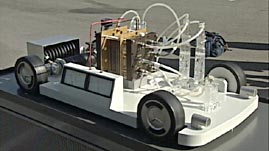Fossil fuels, including coal, petroleum, and natural gas, contain stored energy from organic compounds that originated millions of years ago in living plants and animals. To access this energy, we burn these fuels, and as we do, air pollutants and certain harmful gases are released into the atmosphere. Among these emissions is carbon dioxide (CO
2). Although CO
2 is a naturally occurring and nontoxic gas, human activities have increased its concentration in the atmosphere well beyond natural levels. Most climatologists link heightened levels of atmospheric CO
2 to accelerated global warming. This is because CO
2 (along with methane, nitrous oxide, and water vapor) is a known greenhouse gas, and greenhouse gases act much like the glass of a greenhouse: allowing sunlight in but preventing heat from escaping.
Another possible source of energy for cars -- one that gives off non-toxic by-products -- is hydrogen. Because its by-products don't harm the environment, the hydrogen fuel cell, which produces electricity capable of powering cars and other vehicles, has been touted by many as a promising replacement for the internal combustion engine.
Fuel cell technology is proven but nevertheless problematic. Like batteries, fuel cells turn chemical energy into electricity. A fuel cell, using a platinum catalyst, combines hydrogen and oxygen into water in a way that produces an electric potential, like that of a battery. In vehicles, the electric current is routed to small motors in the wheels, and the by-products -- heat and water -- are released into the air through a tailpipe.
Unlike fossil fuel resources, which are extracted from the ground, hydrogen must be made. Hydrogen can be removed from water using another fuel, such as natural gas or coal, to power the extraction process, but this creates CO
2. Thus, the challenge is to find a way to extract hydrogen using a carbon-free energy source. Non-polluting, renewable sources of energy, like solar cells, wind turbines, or hydroelectric dams, might one day fuel the extraction process, but at present such a solution would not be efficient. The other problem with hydrogen as a fuel is that a distribution and refueling infrastructure to serve drivers of hydrogen-powered cars would be extremely expensive.


 Loading Standards
Loading Standards Teachers' Domain is proud to be a Pathways portal to the National Science Digital Library.
Teachers' Domain is proud to be a Pathways portal to the National Science Digital Library.
